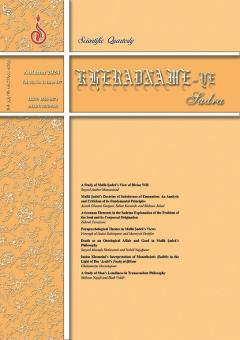Mullā Ṣadrā’s Doctrine of Subsistence of Emanation: An Analysis and Criticism of its Fundamental Principles
Subject Areas : ملاصدراپژوهی و اندیشۀ حکمت متعالیهAzizeh Ghaemi Gargari 1 , Sahar Kavandi 2 , Mohsen Jahed 3
1 - PhD in Islamic Philosophy and Kalam, University of Zanjan, Zanjan, Iran
2 - Professor at the Philosophy Department, University of Zanjan, Zanjan, Iran
3 - Associate Professor, Wisdom and Kalam Department, Shahid Beheshti University, Tehran, Iran
Keywords: Perception, subsistence of emanation, creation of forms, active intellect, Mullā Ṣadrā,
Abstract :
The problem of perception as the basis of knowledge holds a particular status in Islamic philosophy. By employing his own philosophical principles, Mullā Ṣadrā has provided a different philosophical explanation of perception that can be called the doctrine of emanation in contrast to the doctrine of immanence. According to the doctrine of emanation, the soul creates the perceptive forms with its creating power, the aid of supreme principles, and the preparation of external cause. This doctrine enjoys a greater explanatory ability in comparison to other common doctrines; however, it suffers from certain ambiguities that demand more clarification and investigation. Mullā Ṣadrā has not referred to the quality of the actualization of preparations; however, in line with the explanation of the process of emanation and based on the centrality of influential elements in this process (preparation of external things, contribution of supreme principles, similarity, and conformity), it seems that one can provide an acceptable explanation and justification based on the findings of modern cognitive sciences. It is as if Mullā Ṣadrā has deliberately and consciously considered the existence of external objects to be merely an introduction to perception and nothing more. Concerning the quality of the effects of supreme principles in perception, it must be said that the attribution of the emanation of forms to the supreme principles as a distant agent has no contradiction with attributing the creation of these forms to the soul as the close agent. Regarding the quality of the relationship between the created and external forms, Mullā Ṣadrā speaks of their similarity. Nevertheless, it seems that his doctrine has not been much successful in the explanation and justification of the true and one-to-one correspondence between these forms and can merely reveal a superficial match between them.
